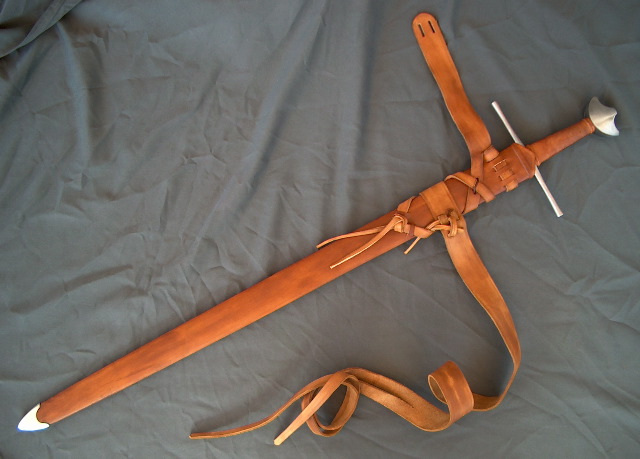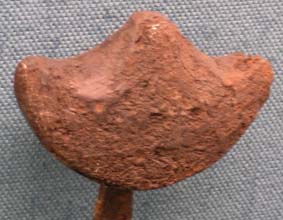Posts: 1,244 Location: New Glarus, WI
Tue 28 Nov, 2006 6:01 am
| Grayson C. wrote: |
on a similar note:
What color grip would be historically accurate and look best on the Ritter? |
I've seen a number of these go out, dressed in nearly every color. My personal preference is for the earthy tones for swords of this period. Oxblood was obviously my choice, but campaign brown or dark brown also look quite nice. Blues, greens, and a fire engine red feel a bit flamboyant to me for this blade, but right at home for something longer and pointier. Take that for what it's worth - strictly my personal preferences.
Also, I'm glad that I was of some help to you. Good luck with your quest to get this piece. I'm sure you'll be happy with it.
Posts: 1,717 Location: Buffalo, NY.
Tue 28 Nov, 2006 7:18 am
That's great you have decided on the Ritter,
I may go for one when I get into the 13th C. I've always thought it would be really cool to buy a NG and pay someone to inlay brass (latten) or silver going down the fuller. The main problem, though is the makers mark which prevents this.
Jeremy
Posts: 223 Location: NCF, Sarasota, FL
Tue 28 Nov, 2006 7:18 pm
One last question before I let this die (you guys have been great so far, thanks for all your help!).
It says the Ritter was meant for a more equestrian version of combat rather than the dirty job of a footsoldier :)
would/does this affect any aspect of the Ritter? I'm afraid I don't have a horse and don't intend on getting one in the near future :lol:
Posts: 45 Location: Sydney
Tue 28 Nov, 2006 9:34 pm
| Aaron Schnatterly wrote: |
| Grayson C. wrote: | on a similar note:
What color grip would be historically accurate and look best on the Ritter? |
I've seen a number of these go out, dressed in nearly every color. My personal preference is for the earthy tones for swords of this period. Oxblood was obviously my choice, but campaign brown or dark brown also look quite nice. ..... |
Well I had mine done in campaign brown and I'm very happy with it (mine):
http://www.christianfletcher.com/Site/Ritter.html
 Attachment: 72.6 KB
Attachment: 72.6 KB

Posts: 147 Location: Overland Park, Kansas
Tue 28 Nov, 2006 9:37 pm
If you are worried about it, maybe you should think about The Reeve. I love that one. The longer blade on The Ritter will be bit less maneuverable, but will be a heavier hitter.
Posts: 147 Location: Overland Park, Kansas
Tue 28 Nov, 2006 9:42 pm
Well it looks like the Reeve is heavier and it could have more blade presence, so maybe scratch that last comment.
Posts: 1,757 Location: Storvreta, Sweden
Wed 29 Nov, 2006 12:30 am
| Grayson C. wrote: |
One last question before I let this die (you guys have been great so far, thanks for all your help!).
It says the Ritter was meant for a more equestrian version of combat rather than the dirty job of a footsoldier :)
would/does this affect any aspect of the Ritter? I'm afraid I don't have a horse and don't intend on getting one in the near future :lol: |
At the time period of the Ritter, the shield was normally a large affair and it was common to see combattants equipped in full mail, cap á pied. This was also a period when the armoured horseman ruled battlefiled. The elite of the society were the fighting nobles who were riding almost before they could walk. As swords were made for the ruling class, it is natural that swords of this period will express certain charactersitics, resulting in priorities in the sword design of the time.
The ritter is, if anything a sword of the lighter end of the weight spectrum for this time period.
If you are not carrying armour and do cutting practice against light targets, you can still use this sword.
It might just be good to know that the type/design has a place in history and that there are reassons for why they were made this way. To me this is a key to appreciate this sword, and most any other sword that has its roots in historical types.
To say it has blade prescence is a relative statement. It is not a boat anchor. Rather it is agile for its size, but naturally, a shorter lighter sword will be quicker.
I designed this sword to express a soft, but definite pull when put in motion. It will feel as it helps you accelerate when you use it in deliberate swings. It is not a sword to be used in wrist flicking motions. It does not feel like a leater era C&T sword. That would be wrong for this type.
The Yeoman, the Reeve, the Poiters are all swords that are very quick, with speed and agility as strong traits in their personality. Such swords need that to be able to perform.
The Ritter has reach and is agile enough to allow you quick manouvers even if you are carrying a large shield. It can also be used with precision, allowing you to hit small targets (like the imagined face opening or hands of a mail clad opponent).
Trying to express the feel of a sword any more precisely than this in writing will easily lead to misumnderstandings.
I hope that your expectations of a sword of this type is met and possibly exceeded with the Ritter.
This sword has personality and can be used to good effect. It is made to show what a sword from a specific time period could actually feel like and look like when new.
I attach one more picture of a pommel of this type. This is an excavated specimen (on display in Kopenhagen at the National Museum). It has rusted so much that the surface and some of the lines are affected. I think you can still see that it is rather acutely defined. Especially the cut outs on each side of the top, define saddle shaped surfaces with distinct lines or bevels towards the face of the pommel. The top is now a bit rounded out, but was roiginally more flat and more crisp in its definition.
If anything contemprary versions of this type of pommel lack the volume and shape and definition of the originals. Thye had swelling surfaces, but often also crisp lines dividing the planes.
Then there are those that are softer an less defined as well. Still with a lot of voume, but more like a well used soap.
The ritter is not intened to follow the example of that version of this type.
 Attachment: 46.71 KB
Attachment: 46.71 KB

You
cannot post new topics in this forum
You
cannot reply to topics in this forum
You
cannot edit your posts in this forum
You
cannot delete your posts in this forum
You
cannot vote in polls in this forum
You
cannot attach files in this forum
You
can download files in this forum

